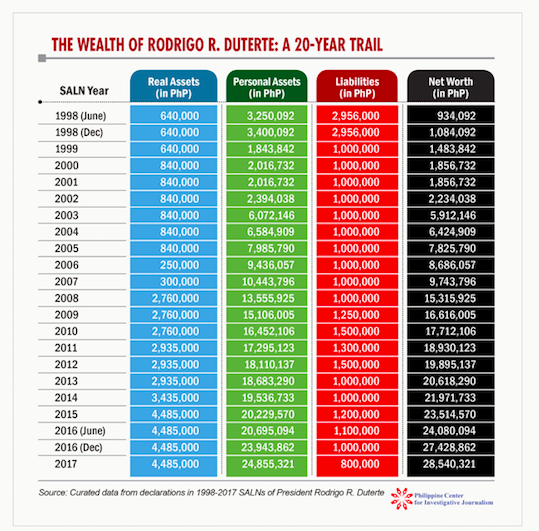PCIJ Investigates Dutertes’ Wealth

THE STATEMENT of Assets, Liabilities and Net Worth (SALN) has been a reliable means of determining the honesty of government officials and employees — a way of tracking corruption during the terms of office served by those appointed or elected to government positions.
Accomplished under oath by a public official, the SALN can establish if the official filed false information or listed questionable gains in assets, which may result in his or her being called to account or even being impeached, as in the case of the late Chief Justice Renato Corona.
Because
CMFR cheers the Philippine Center for Investigative Journalism (PCIJ) for a series that utilized the SALNs of President Rodrigo Duterte, his daughter, Sara, and his son, Paolo, to look into the wealth of these members of the current First Family.
PCIJ’s three-part report, “The Dutertes: Wealth reveal and riddles” examined the SALNs that President Rodrigo Duterte filed in his 20 years as a public official as well as those of his two children over the last 11 years. A close and careful review of the paper trail is one of the fundamentals of investigative reporting to establish if there are irregularities in the conduct of government officials. PCIJ also wrote the offices of all three Dutertes asking for comment and clarification, and reported the responses that they received as well as those they didn’t.
PCIJ’s analysis found discrepancies, nondisclosures and misdeclarations in the information in the SALNs of the Dutertes. Among the key findings of the series are:
- The non-registration with the Securities and Exchange Commission (SEC) of Sara Duterte’s and husband
Manases Carpio’s law firm since its establishment; - Possible conflicts of interest due to Rodrigo and Sara Duterte’s practicing their profession and being public officials at the same time;
- Inconsistencies in the disclosure of Duterte business interests and even the nondisclosure of others, despite documents from the Securities and Exchange Commission (SEC) showing the involvement of the three in these interests;
- The involvement with companies not registered with either the SEC or the Department of Trade and Industry (DTI) of Paolo Duterte, who has a loan from the owner of one such company;
- President Duterte and his son Paolo’s loans from Davao businessmen, some of whom are their business partners and campaign donors;
- The growth in the three Dutertes’ wealth and assets, “even on their modest salaries” as public officials and “despite negligible retained earnings reflected in the financial statements of the companies they own or co-own”;
- Erroneous declarations of the value of their assets, and how the transfer of assets from father to children was effected;
- Untouched cash assets for all three, even for campaign spending; and
- Inconsistencies in all three’s declarations of the positions held by relatives in government service.
Duterte’s Solicitor General pursued the quo warranto case against then Chief Justice Maria Lourdes Sereno, based on her alleged failure to file previous SALNs as a former law professor at the University of the Philippines. And yet, the findings of the PCIJ series suggest that the Dutertes, including the highest official of the land himself, habitually disregarded their obligation to report all their assets as required by the law.
Mindanews, Rappler and Davao Today published the PCIJ series, as should other media organizations who could pursue the leads that PCIJ has provided, among them the conflict between the Duterte administration’s declared policy of transparency and anti-corruption. Media reported the reaction of President Duterte who took offense and implied that PCIJ was bribed by the “yellows” to disparage him and his family. Journalists should at least have referred to the obvious discrepancy between Duterte’s word and action on the issue of SALN as well as the blatant inconsistency in the administration’s application of sanctions on the failure to observe this obligation.
Leave a Reply